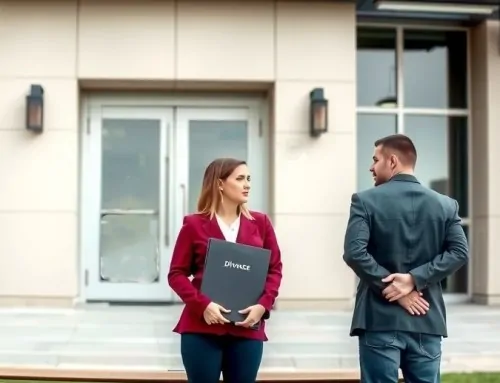What to Do If Your Spouse is Unwilling to Cooperate
Sometimes relationships must come to an end, but divorce is never an easy process. This may be especially true when there are children involved in the marriage.
Despite the challenges, when both parties agree to cooperate and work together in ending the marriage, the stress and time related to a divorce can be reduced. As many couples have come to realize, though, easily agreeing on every aspect is unfortunately seldom the case.
What can you do if, despite your best efforts, your spouse is unwilling to cooperate? Let’s take a look at some ways a spouse may refuse to cooperate and three steps you can take when you are working with an uncooperative spouse.
Common Tactics of Uncooperative Spouses
Dealing with an uncooperative partner in a divorce is, unfortunately, not uncommon. In fact, personality differences and arguments that may have led to the breakdown of the marriage can often spill over into the divorce process, making issues even more difficult to resolve.
Whether your partner is responding differently from what was expected or not, notice the following common tactics that uncooperative spouses tend to use in an effort to delay or disrupt the proceedings.
Tactic 1: Avoiding the papers
The first tactic uncooperative spouses often take is trying to avoid getting served with their divorce petition. They may be under the impression that the divorce process cannot go forward if they cannot be served.
Tactic 2: Refusing to communicate
Another common tactic of an uncooperative spouse is an outright refusal to communicate or collaborate. He or she may even refuse to be in the same room as the other spouse, shutting down any attempts at an amicable resolution.
Tactic 3: Hiding information or assets
Another way your partner’s behavior proves to be uncooperative is when he or she tries to hide important information during the divorce proceedings.
The spouse may engage in financial trickery by concealing assets, withholding necessary funds, or other means of disrupting the divorce proceedings. He or she may also try to hide or deny access to important documents such as property deeds and bank statements.
Even when you are dealing with an uncooperative spouse, you can take some steps to handle the situation.
Step One: Find Out Why
This first step can be a challenge, especially if communication issues played a role in the decision to divorce. Even though uncovering the reasons can be difficult, try to understand what is making your spouse uncooperative.
Is it an emotional reason? Maybe he or she is hoping to drag out the process in the hopes that you can patch things up and get back together. Your spouse may believe that couples counseling or couples therapy is all that is needed to resolve your marriage issues.
Is it a financial reason? Sometimes, a spouse refuses to cooperate in a divorce due to fear of losing out on financial benefits tied to the marriage, such as access to health insurance or a certain style of living.
Is it out of anger? Some spouses may be uncooperative out of vindictiveness, trying to purposefully make things as hard as possible in an attempt to “get back” or take revenge on the other spouse.
Knowing why your partner refuses to be cooperative is a good place to start in figuring out the best way to handle the situation.
Step Two: Keep Records of Everything
Divorce proceedings are always a challenge; it’s easy to fall into the trap of “he said/she said” arguments that don’t have any backing or proof. Thus, it’s always a good idea to keep communication in writing.
Some important pieces of evidence that can be helpful to record in a divorce case include:
- Proof of contact: When numerous attempts at establishing contact have failed, evidence of this can help prove that the other spouse is unresponsive and uncooperative. Records of missed phone calls, ignored text messages, and unread emails could be shown, for instance.
- Combative or uncooperative communication: Messages that are combative or inflammatory can show a refusal to cooperate or collaborate.
- Badmouthing or attempts at alienation: Other types of evidence can include proof of the other spouse using hurtful speech or attempting to use the children as pawns in the divorce.
Types of evidence that can be used during a divorce procedure include messages, emails, and video recordings.
Of course, be forewarned: Your spouse may be looking for evidence against you, as well. It is important to watch what you say and make sure your communication remains peaceful. Even when tensions and emotions run high, try to avoid inflammatory or abusive speech, as it might only make things worse.
Step Three: Consider Your Options
A consultation with a divorce lawyer can help you consider your options when you are dealing with a spouse who is unwilling to cooperate. Depending on the specific circumstances of your situation and marriage, the attorney can help you determine, plan, and execute your next steps.
Mediation
If your partner refuses to come to an agreement on one or more terms, the first step towards ending the marriage is often mediation. Ideally, both parties are able to come to an agreement through mediation without needing to go to trial.
What if one of the spouses refuses to be in the same room or communicate with the other? Even in a case like this, mediation can still help. In many cases, spouses are able to go through the mediation process without being in the same room as each other.
Instead, the mediator will get to know the issues at hand from the point of view of each spouse and try to help reach a mutually beneficial compromise. Depending on how mediation goes, it can take place over several sessions before an agreement is reached.
Court
The vast majority of divorce cases are able to be resolved before going to court. Generally, a trial is a last resort in most legal cases, including divorces. However, if a spouse refuses to cooperate or agree despite all efforts and mediation, a trial before a judge may be the only option.
When a divorce case needs to go to court, both partners in the marriage will have the chance to present their arguments and evidence before the judge. There may be witnesses called, especially when child custody is one of the relationship issues being contested in the divorce. After closing arguments, the judge will present his or her final judgment.
Once the judge grants the final divorce decree, the divorce is official. If one partner disagrees with the decision, he or she must file a notice of appeal within 30 days.
Default judgment
Divorce papers include two documents – the “Divorce Petition” and the “Summons.” In the divorce complaint, the spouse that files for divorce outlines the terms that he or she is pursuing in ending the marriage. The summons tells the other spouse to respond to the court within a certain amount of time if he or she does not agree to the terms in the complaint.
Generally, a spouse being served in Utah has 21 days to respond to the divorce complaint. If there is no response, a spouse can receive a default judgment, meaning that the judge grants a divorce as outlined in the complaint.
Step Four: Get the Help You Need
Even in the best of circumstances, divorce is often a stressful and emotionally hard process. It can become especially difficult when one spouse refuses to cooperate.
A family therapist or clinical psychologist can be helpful when dealing with a divorce. These medical professionals can help not only you but also your children cope with the tremendous effect divorce inevitably has on the family.
In addition to getting help for navigating the emotional and mental challenges, divorce is also a legal process that can be complicated and overwhelming. An experienced Utah divorce lawyer can be an invaluable resource to help you with your divorce.
With a lawyer by your side, it gets easier for you and your spouse to focus on the necessary legal concerns at hand instead of becoming sidelined by relationship issues and arguments. In addition, your lawyer can help you fight for the best interests of you and your children.
Talk to the Team at Brown Family Law
At Brown Family Law, our goal is to minimize the stress and frustration a divorce can cause. We want to hear your story – and understand who your family is, what happened with your marriage, and what goals you have for yourself and your children’s future.
We understand that you might not want to have to go to court to finalize your divorce, and that’s why we can help you resolve as many of your issues as possible before resorting to litigation.
With the help of our experienced legal team, you will have the resources and support you need to find a resolution that works for you so that you can be free of your marriage and move forward with your life.
Call us 24/7 at 801-685-9999 to schedule your divorce consultation with the Utah divorce lawyers at Brown Family Law, and see how we can help you.










